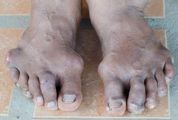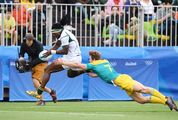AS SOUTH Africa ground to a halt after the death of Nelson Mandela, the JSE followed suit.
In an unprecedented move, the local bourse stopped trading temporarily at 11am for five minutes to pay respect to the country’s most celebrated son.
Nicky Newton-King, the CEO of the JSE, said the only other time the bourse stopped trading was back in 1994 when Mandela walked onto the exchange’s trading floor.
“We didn’t really need to halt the market that day — it did by itself, because people are so in awe of the man,” Newton-King said.
After the markets resumed trade there were some winners such as Nampak (2.6%), Grindrod (2.6%) and Remgro (2.11%), which offset the losses of companies such as Caxton, Assore and Brait.
The JSE’s all share index gained half a percentage point, close to its record high of 45,000 points.
The rand, perhaps the best indicator of the mood of foreign investors, showed no major reaction to Mandela’s death. It was at R10.30 to the dollar, down only 1% from the previous day.
Analysts said markets were focused on the release of US payroll figures.
It has long been speculated that Mandela’s death would spark a flurry of stock market activity. But the market’s behaviour was no different from any other day.
Cannon Asset Management CEO Geoff Blount said Mandela had largely ceased to be a factor in market economics.
“This is possibly Madiba’s great legacy: how he engineered his withdrawal from the country’s governance. This is the ultimate in succession planning,” Mr Blount said.
“(The) economy is driven by policy and the current government. The course is set.”
Nadim Mohamed, equity analyst at First Avenue Investment Management, said the news was “much expected”.
“If the market had reacted, it would have been lower. Instead it was higher, so there’s no indication (of) any effect.”
• This article was first published in Sunday Times: Business Times
JSE CEO Nicky Newton-King. Picture: ARNOLD PRONTO
AS SOUTH Africa ground to a halt after the death of Nelson Mandela, the JSE followed suit.
In an unprecedented move, the local bourse stopped trading temporarily at 11am for five minutes to pay respect to the country’s most celebrated son.
Nicky Newton-King, the CEO of the JSE, said the only other time the bourse stopped trading was back in 1994 when Mandela walked onto the exchange’s trading floor.
“We didn’t really need to halt the market that day — it did by itself, because people are so in awe of the man,” Newton-King said.
After the markets resumed trade there were some winners such as Nampak (2.6%), Grindrod (2.6%) and Remgro (2.11%), which offset the losses of companies such as Caxton, Assore and Brait.
The JSE’s all share index gained half a percentage point, close to its record high of 45,000 points.
The rand, perhaps the best indicator of the mood of foreign investors, showed no major reaction to Mandela’s death. It was at R10.30 to the dollar, down only 1% from the previous day.
Analysts said markets were focused on the release of US payroll figures.
It has long been speculated that Mandela’s death would spark a flurry of stock market activity. But the market’s behaviour was no different from any other day.
Cannon Asset Management CEO Geoff Blount said Mandela had largely ceased to be a factor in market economics.
“This is possibly Madiba’s great legacy: how he engineered his withdrawal from the country’s governance. This is the ultimate in succession planning,” Mr Blount said.
“(The) economy is driven by policy and the current government. The course is set.”
Nadim Mohamed, equity analyst at First Avenue Investment Management, said the news was “much expected”.
“If the market had reacted, it would have been lower. Instead it was higher, so there’s no indication (of) any effect.”
• This article was first published in Sunday Times: Business Times













 News and views on the death, and life, of former president Nelson Mandela, with tributes and photographs
News and views on the death, and life, of former president Nelson Mandela, with tributes and photographs







